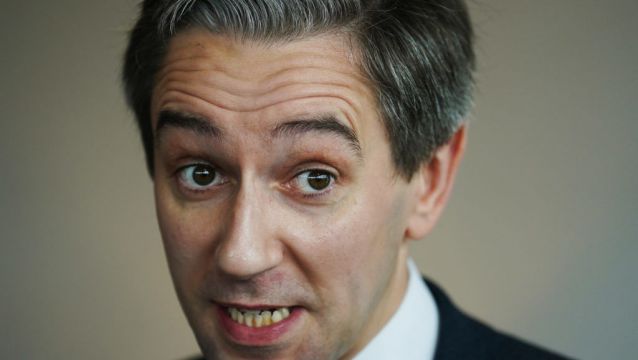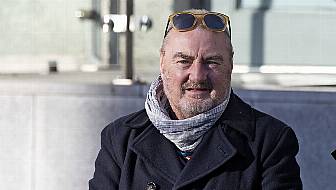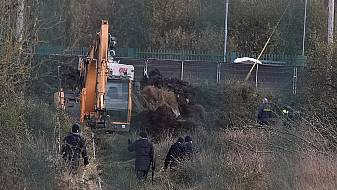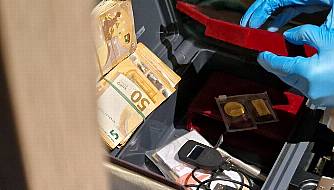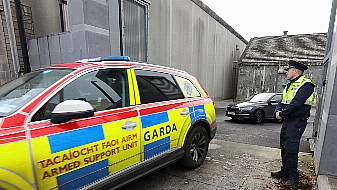There is "no betting" that Simon Harris will be the next leader of Fine Gael, most likely after the next general election, according to former minister for agriculture Ivan Yates.
He has launched a new podcast, 'Path to Power', along with journalist Matt Cooper, with the pair reuniting after hosting the Tonight Show together between 2017 and 2020.
Mr Yates told BreakingNews.ie: "The context is that 2024, these 52 episodes we're committed to, will give a front row seat to what promises to be a historic year in Irish politics.
"Building since 2020, we've had no election in four years - no general election, no European election, no local election - and I think that looking at polls, looking at the change zeitgeist, which is a constant factor in politics; whether it's Barack Obama, Tony Blair or whoever.
"I think that we're on the cusp of a very significant year whereby a younger generation again have a lot to say about the way they feel left out of the system; in terms of unaffordable homes, not having the pension prospects their parents had. I sense an intergenerational, attritional situation, whereby young people under 40 will vote differently to their parents over 55.
"My own particular experience of 20 years campaigning in politics, and 12 years of being a pundit and in the media, is very timely. It's my subject of choice in terms of inhaling politics and also working with Matt again. We are different, we have different outlooks in so far as he is a journalist, I'm not. He is quite woke, whereas I see myself as being a pundit, relying on my intuition, instinct and my experience.
"Two factors: we are of a maturity where we can take what we talk about very seriously, but not take ourselves seriously. We can argue about politics without cancelling each other, we can actually have arguments as opposed to debates, because we worked over three years together. I think we're robust enough to make it very interesting, it won't be conventional."
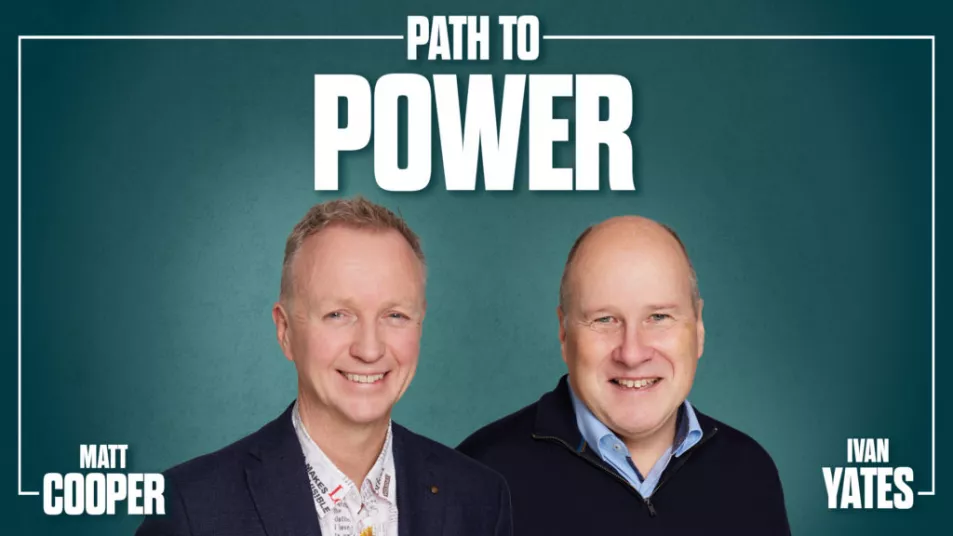
While Taoiseach Leo Varadkar has insisted the Coalition government is not planning for a 2024 general election, TDs and senators reportedly think it is only a matter of timing.
The next general election has to be held by March 2025, but it is widely expected it will be called some time in 2024.
Mr Yates believes Sinn Féin will claim "a minimum of 52 seats and a maximum of 72 seats".
However, Mr Yates predicted a number of issues Sinn Féin will face in taking power. He cited their changing stance on migration as an area where they may struggle.
"We have seen Sinn Féin ameliorating their success in the polls from 34 per cent to 27 per cent. I think this can be directly attributed to them being out of step with the migration issue, and amongst their own supporters being too much seen as part of the political consensus.
"I actually see steps being taken by Mary Lou [McDonald] to reverse engines on that and take yet another more populist approach. Micheál [Martin] and Leo [Varadkar] have both been taoiseach. She has never been a minister, so there will be a lot of hurdles for Sinn Féin and Mary Lou.
"Some things will come under scrutiny like never before. Therefore, it will be interesting to see how she rides those storms that are inevitably ahead.
"In the last six weeks, there has been a definite pivot by Mary Lou McDonald in interviews she has given... firstly saying we should allow people to be in favour of tighter vetting, not labelling them racist or far-right. Then she took steps to appeal to people who feel outside of the political pale because of their views.
"I think the migration issue is a bit of a problem for Sinn Féin in so far as they have to ride both horses. They have to be ambiguous on the issue. The people who want controls on migration are most likely to be working class people who instinctively vote Sinn Féin. I don't think problems arising from migration are in middle class areas where Fine Gael may get more votes.
"It's a real problem for Sinn Féin as opposed to an opportunity for them, and the fact they're shifting their views on that shows it."

On the migration issue, Mr Yates feels there is an urban-rural divide.
"I would point to Killarney as an example. It is not a bastion of the far-right, it is not inherently racist because it lives off of foreign tourists coming to stay there, it lives off of people getting work permits to work there. They have taken in 4,500 Ukrainian refugees, and they have 700 international protection applicants. When you see a silent protest by the people of Killarney, who would innately be conservative, I think it is time to look at what is happening and look at the practicalities of taking in tens of thousands of people on top of those here already.
"Ireland is no different to Italy, the Netherlands, France. There is increasingly going to be a view at ballot boxes that open borders is not a sustainable policy given global conflict, global warming, and that Europe cannot take on board all the world's migrants.
"An unspoken reassessment of that is taking place in pubs, family homes. People who I know offered to take in Ukrainians in February 2022, they now think enough is enough.
"I would certainly draw the line at criminal damage, those who are prepared to indulge in criminal damage. I don't think there is any public support for that... the rioters, the incident in Galway, that's not where middle Ireland is, but I don't think they agree with the government's position that this is our humanitarian obligation, period. That doesn't mean, at the same time, that middle Ireland is not disgusted at people burning Luas trams, pubs or hotels."
He said government formation will be difficult for Sinn Féin, as they may have to consider a coalition with Fianna Fáil if they can not come to an agreement with Independents or TDs from the likes of the Social Democrats or People Before Profit.
"If they're on the low 60s they will have to embrace Fianna Fáil or Fine Gael. There are a couple of factors there... one is, if it's not a rotating Taoiseach scenario, there is a real danger, for Fianna Fáil in particular. If they become the mudguard of a Sinn Féin government. During the election, Fianna Fáil can argue they are the alternative to a left-wing government by offering to talk to Sinn Féin.
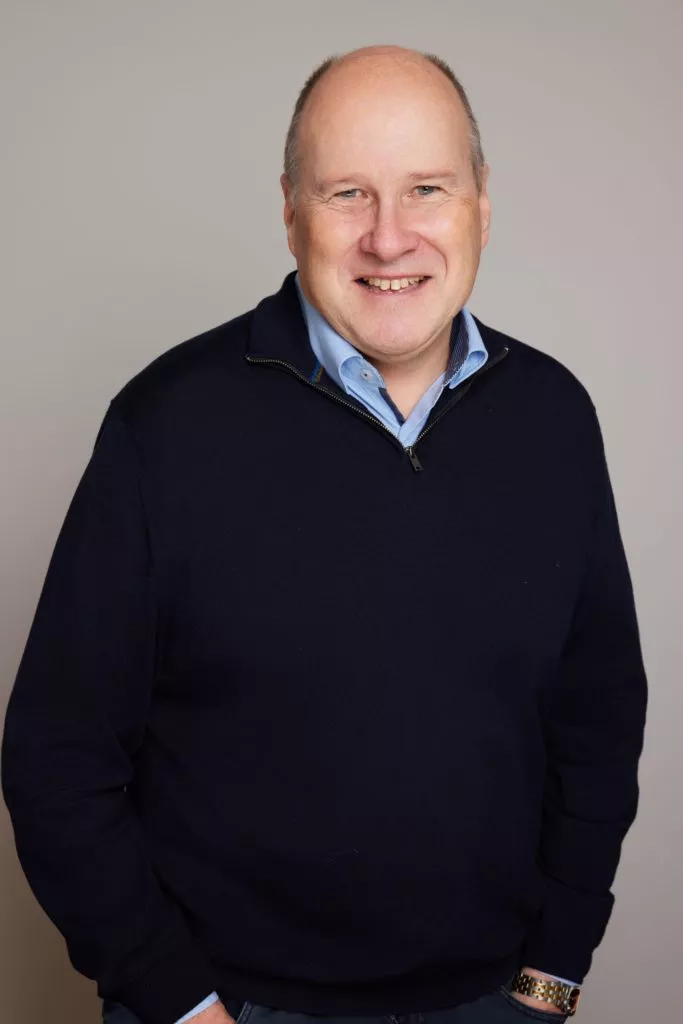
"I think Fine Gael will just want to rejuvenate themselves in opposition. Like Fianna Fáil in 2011, I think they could do worse than their lowest watermark of 18.7 per cent in 2002. Speaking to Fine Gael TDs, they don't think they have 20 per cent, and are nervous about their own seats.
"The number of retirements in Fine Gael, as happened with the Labour Party previously, will have a very big impact because if you voted for Brendan Howlin, Richard Bruton, Charlie Flanagan, Michael Creed and his father before him, there's no guarantee a shiny new Fine Gael councillor will get those votes.
"Younger TDs like John Paul Phelan, Joe McHugh, Brendan Griffin, are not bona fide retirements going for the travel pass, they are people opting out of politics who have maybe lost the faith and want to do something else with their lives, which is absolutely valid.
"It will leave a residual problem for Fine Gael."
Meanwhile, the former Fine Gael minister thinks there will be a shake-up in the leadership in both Fine Gael and Fianna Fáil after the next election.
He feels Minister for Higher Education Simon Harris will be the next leader of his former party.
I think that there is no betting that Simon Harris will be the next leader of Fine Gael.
"I think that there is no betting that Simon Harris will be the next leader of Fine Gael. I think he would rather take on the party in opposition with Sinn Féin in government. He would see it as fertile ground for the party to grow its identity, its brand and its base in the middle class, self-employed, and business communities, to get a solid party of 40 to 50 seats going forward.
"I think he toyed with the idea of taking on Leo before and thought the better of it. Let's be clear, Leo is no longer the future. I don't say that out of any dislike or disrespect for him. Everybody reaches a point in their political career where they were once the future and are no longer the future and Leo has reached that point.
"In terms of a competitor to Harris, who wants it and has the best CV, connections and network inside and outside the party, Helen McEntee has gone backwards with her term in justice. I think she's a nice person but lacks authority and that's not what's required in a minister for justice or party leader.
"I think Jennifer Carroll MacNeill will be the likely opponent for Simon Harris.
"Observing Leo, and his talent and CV, I think he's already auditioning for an internationalist job... be it UN, EU or WHO. I think looking at his passion and interests in his second term as Taoiseach, the things he gets most exercised about are on the international stage. One of the most pro-Ukraine leaders, the most collegiate in welcoming refugees per head of our population, and also I think he's made noises that haven't been as pro-Israel as others."
On Fianna Fáil, Mr Yates feels the possible coalition with Sinn Féin will be the final straw for Micheál Martin, who he backed for a bid for the presidency in 2025.
"Martin has been a TD since '87 and a minister on and off since '97, he saved the party from a near-death experience, has done his bit. By not going for the EU Commission job, which would have been an appropriate culmination of his career moving from foreign affairs, I think he wants to be the next president in 2025.
"I don't see him leading Fianna Fáil after the election into a government with Sinn Féin. That would be a break point for him personally, but it wouldn't be for his party. If you go through the ministers and junior ministers, you will find that they drew the conclusion of why they did worse in 2020 than 2016, is confidence-and-supply went on too long. They were joint at the hip with Fine Gael and weren't able to oppose the outgoing government as they would have liked to.
"I think they've come to the conclusion at corporate level that they are a party of government, not opposition. They have come to the conclusion at an individual level that they've only been ministers for a short time.
"If Fine Gael and Fianna Fáil lose power it will be a milestone moment, there won't be a need for a push or an ambush. I think both Micheál and Leo will say they've done their bit, highlight their achievements and say they're proud of them.
"I think Micheál will focus on the presidency, I think Michael McGrath most likely will be the new leader. There will be a contest and I would see it between him, Darragh O'Brien and Jack Chambers, as of now, and this could change, but McGrath is best placed.
"My sense of both is that the fallout of the election rather than internal rows will dictate events."
Sources have indicated the most likely date for a general election is November 2024, not long after the next budget, which the Government hope will give them a boost.
However, Mr Yates feels a surprise election in June, even before the local and European elections (June 6th to 9th) could be the Government's best chance at stopping Sinn Féin sweeping into power.
"The assumption is this government has a sporting chance of being re-elected. When they get back to party politics, campaigning and elections on their own identity as opposed to running the country, they will trade on their record, but I see a divergence in Fine Gael and Fianna Fáil's interests after the next election and I actually don't think you can count the sum of the parts as they may be moving in opposite directions.
"Sinn Féin left 12 seats behind them, they had enough votes for 50 seats, they got 37 or whatever, didn't run enough candidates, and I think their strategy is to go from 78 council seats to something like 240 council seats and use those poll-topping candidates in the autumn to win Dáil seats.
"If the government outmanoeuvre them by holding the election before the local elections, you've a difficult situation. Your councillor base, a new tentative base, which election will they go for. They can't go for both?
"The perfect scenario for Sinn Féin is a general election some months after the local elections, in which case they will have built up momentum, a candidate infrastructure, but they'll be able to have a narrative of saying that the government is a lame duck administration, clinging onto power. I think Fine Gael strategists should see that and actually would prefer an early election.

"However, I think Fianna Fáil and the Green Party will want to stay in office for as long as possible, and in fairness to them, they have a signed deal for five budgets.
"You think something will crop up to change your luck. Enda Kenny made a huge mistake in not going earlier than 2016. He was persuaded to stay, and it's clear to me that the economy, the presentation of the government's record in office in terms of employment, public finances, would look best in June.
"If I was Leo, I would prevail with my colleagues in the mutual self-interest of going then to stop the juggernaut of Sinn Féin."
The first two episodes of Path to Power are available on all major audio platforms, with new episodes being released on Fridays.
